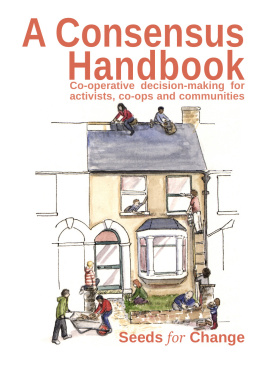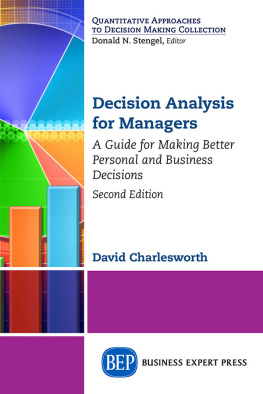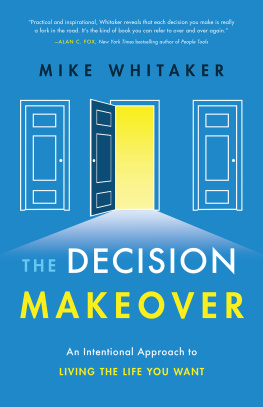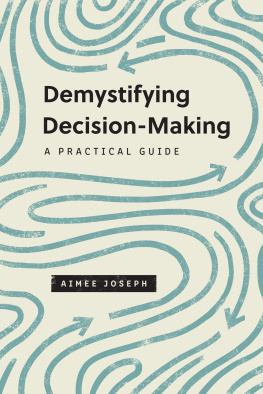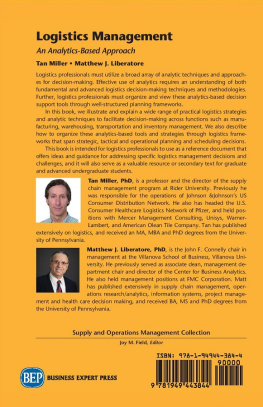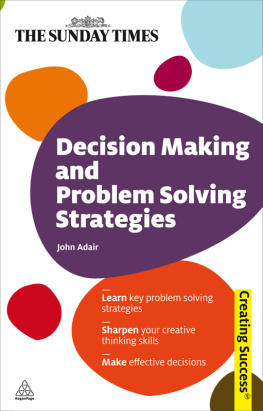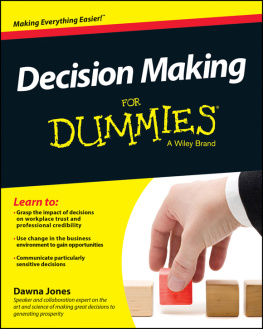A Consensus Handbook
Co-operative decision making for activists, co-ops andcommunities
by
Seeds for Change
Published in 2013 by Seeds for Change Lancaster Co-operative Ltdwww.seedsforchange.org.uk
Illustrated by: Carrie MacKinnon
Text licensed under the Creative Commons Attribution-Non-Commercial-Share-Alike 4.0 International License. View a copy of this license at: www.creativecommons.org/licenses/by-nc-sa/4.0/
First edition, eISBN 978-0-9575871-1-3
First Edition, paperback ISBN 978-0-9575871-0-6
Foreword to ebook edition
Welcome to the ebook edition of A Consensus Handbook . This edition has the complete text of the paperback, but unfortunately, due to the restrictions and vagaries of many ebook formats we decided to play it safe and removed almost all of the wonderful pictures that Carrie MacKinnon drew for this book. You can get the paperback edition and PDF (with pictures) from www.seedsforchange.org.uk.
Foreword
This book is all about consensus decision making. In chaptersone to six we look at the fundamentals of consensus decisionmaking: what it is, how to do it, what qualities we need inourselves and in our groups to make it work; along with tools andtechniques to help when facilitating a consensus process.
The next two chapters are all about confronting the challengeswe face in using consensus. Here youll find troubleshooting tips,as well as an exploration of how to address deeper issues, such asinterpersonal conflict and power dynamics.
The final chapter, Consensus in widersociety , is different from the rest of book. In every otherchapter weve aimed to share what weve observed and learnt asfacilitators over the years, but in this chapter, which is abouthow a society based on consensus might work, weve allowedourselves to dream a little. As well as applying our ownexperiences and observations weve included a lot of material basedon intuition and guesswork. We find that the more we think aboutthis subject, the more questions we have, and we hope that thischapter will create more questions in our readers, and hopefullysome answers too.
About Seeds for Change
Seeds for Change has been providingsupport and workshops to grassroots activists on consensus,facilitation and campaign skills since 2000. Weve distilled ourcollective knowledge and experience into these pages, using newmaterial along with extracts from resources created morerecently.
Seeds for Change is aworkers co-op, and all members are active in grassroots social andenvironmental justice campaigning as well as in the co-operativemovement. Weve been campaigning on various issues such as peace,roads, GM, climate change and have been involved in setting up andrunning various community resource centres. As the Seeds for Change Network we concentrate on workingwith grassroots environmental and social justice activists to helpincrease their effectiveness in campaigning and bringing aboutlasting positive change. Providing training, resources and supportto grassroots campaigners is still the main focus of our work, andthis is financed by donations and working part time as trainers forNGOs, co-ops and charities.
Particular thanks go to Carrie MacKinnon for all theillustrations she has done for us over the years, including forthis book. But we would also like to thank all the many people andgroups who have thought about, written about and talked aboutconsensus and facilitation. We believe that there are no new ideasin the world, just recycled ones. The choice of words that make upthis handbook (and any mistakes) are all our own. But the concepts,the experiences and thoughts that underlie what we have writtenhave come from all over the world. In that spirit we make ourresources and materials @nti-copyright so that others too maybenefit in the way we have. We encourage youto adapt, pirate, scavenge, recycle, translate, criticise, rebuildand redistribute anything and everything in this book. Enjoy!
Further resources
If youre looking for materials to distribute in your group thenhave a look at the resources available on our website. Youll findintroductory and longer guides to all the themes in this book,along with other topics of interest to grassroots activists. Aswith this book, these guides can be downloaded for free, and are@nti-copyright, so you can change or translate them to fit yourgroups needs. Weve listed other resources that we have founduseful on the inside back cover. www.seedsforchange.org.uk
Chapter 1: Making decisions by consensus
Consensus decision making is a creative anddynamic way of reaching agreement between all members of a group.Instead of simply voting for an item and having the majority of thegroup get their way, a consensus group is committed to findingsolutions that everyone actively supports, or at least can livewith. All decisions are made with the consent of everyoneinvolved, and this ensures that all opinions, ideas and concernsare taken into account. Through listening closely to each other,the group aims to come up with proposals that work for everyone.Consensus is neither compromise nor unanimity - it aims to gofurther by weaving together everyones best ideas and key concerns- a process that often results in surprising and creativesolutions, inspiring both the individual and the group as a whole.
At the heart of consensus is a respectful dialogue betweenequals. Its about how to work with each other rather than for or against each other - it rejects sidetaking, point scoring and strategic manoeuvring. Consensus islooking for win win solutions that are acceptable to all, withthe direct benefit that everyone agrees with the final decision,resulting in a greater commitment to actually turning it intoreality.
Consensus can work in all types of settings - small voluntarygroups, local communities, businesses, theoretically even wholenations and territories. The processes may differ depending on thesize of the group and other factors, but the basic principle of co-operation between equals remains the same.
Whats wrong with the democracy weve got?
How we make decisions is the key to how oursociety is organised. It influences every aspect of ourlives including our places of work, local communities,health services, and even whether we live in war or in peace.
Many of us have been brought up to believe that the westernstyle system of voting is the highest form of democracy. Yet in thevery nations which shout loudest about the virtues of democracy,many people dont even bother to vote any more; they feel itdoesnt actually make any difference to their lives as mostdecisions are made by elite of powerful politicians and businesspeople.
Representative democracies
Power and decision making is taken away from ordinary peoplewhen they vote for leaders - handing over their power to makedecisions to a small elite with very different interests from theirown. Being allowed to vote 20 times in a lifetime for an MP orother political representatives is a poor substitute for having thepower ourselves to make the decisions that affect every aspect ofour lives.
In addition, there are many areas of society where democraticprinciples have little influence. Most institutions and work placesare entirely hierarchical - students and employees dont usuallyget a chance to vote their superiors into office or have anydecision making power in the places where they spend the greatestpart of their lives. Or consider the supermarket chain muscling itsway into a town against the will of local people. Most areas ofsociety are ruled by power, status and money, not throughdemocracy.
Most social systems, includingrepresentative democracies rely on a system of hierarchy,where most of the power lies with a small group of decision-makerson top, while the much larger group of people at the bottom havelittle or no say. Those at the top would have you believe that sucha system of hierarchy is the natural order of things. They arguethat people are selfish by nature and need a set of morals, rulesand laws to control behaviour. These rules need to be enforced by asystem of control, where some people have more power than others.Leaders are necessary to tell people how to live their lives,direct them at work and structure society. They are backed up bypolice and military who use real or threatened violence to keepeveryone within their law.

